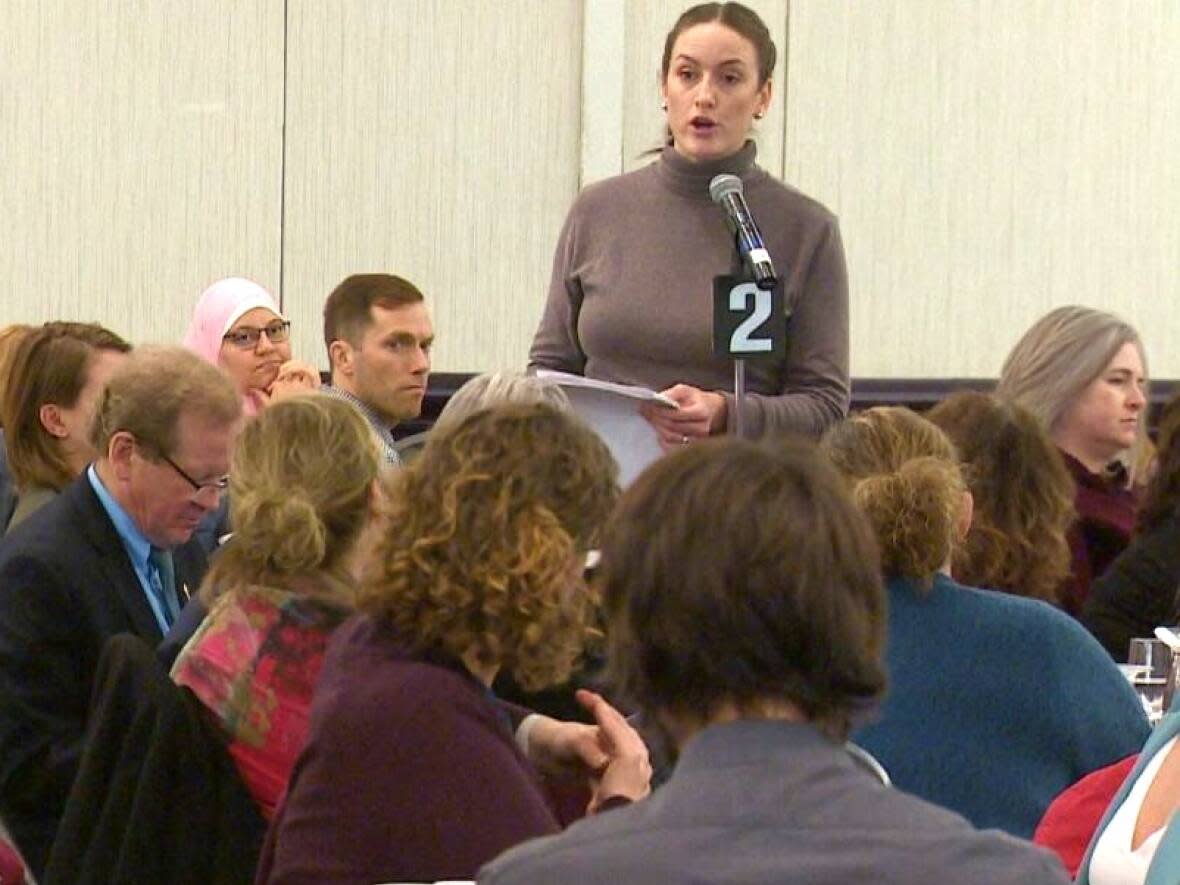Criticisms soar in Fredericton as speakers attack N.B. plan to replace French education


Education Minister Bill Hogan heard yet more Wednesday night from teachers and parents who are critical of a plan he's spearheading to drastically revamp French language education for anglophone students in New Brunswick.
The fourth and final in-person public consultation session on the province's proposed "innovative immersion program" drew a crowd of more than 300 people in Fredericton.
Of the 34 speakers who rose to address the issue, not one spoke in favour of the plan — echoing the same dynamic at a meeting the night before in Saint John.
Criticisms focused on the lack of evidence that the government presented to demonstrate the new program's merits, and concerns about adding stress to teachers who are already overwhelmed amid staff shortages and a lack of resources.
"If you decide to remodel a kitchen, one would think that they would spend time, money and other resources improving the kitchen rather than replacing the entire house," said Heather Hollett, who identified herself as an educator working in Anglophone School District West.
"Likewise, if an issue has been identified, rather than taking apart the system, I would suggest gathering data and pouring resources… into education by way of more educational assistants, behaviour mentors, support intervention workers."
Meanwhile, Donna McLaughlin, a retired teacher, said the public has yet to see the data supporting the proposed changes.
"We haven't seen the research that you are proposing. You have yet to mention who your experts are," she said.

The New Brunswick government announced in December that it will start phasing out French immersion in September, replacing it at the kindergarten and Grade 1 levels with a program that will see all students spend half their classroom time learning English and half learning French.
That is less French than the current immersion program but more French than what non-immersion students now get.
In-person consultations on the planned changes were held in Bathurst and in Moncton last week, with participants at the Moncton session heckling Hogan and forcing the event organizers to abandon the original format in favour of one closer resembling an open-mic format. None of the roughly 20 people who spoke there were in favour of the proposed changes.
Head of language institute denounces plan
Attendees included Paula Kristmanson, director of the Second Language Research Institute of Canada at the University of New Brunswick.
Kristmanson said the institute, made up of teachers and educators at UNB's faculty of education, promotes evidence-based approaches to French second-language training, and supports well-researched initiatives to enhance it.

"However, we are deeply troubled with the most recent announcement to implement one new French second language program for all in September 2023," Kristmanson said.
"Our concerns relate not only to the compressed timeline, which makes the development of any sound program practically impossible, but also to the potential elimination of French Immersion, which is the only [French second language] program that has proven results with respect to learning French second language."
Moira Buyting, who has children currently in French immersion, said she's concerned New Brunswick could become less bilingual under a program that doesn't offer as intense French second-language training as is offered with the current immersion program.
She also questioned whether teachers will have enough time to get prepared for the change in time for its planned implementation next fall.
"We have just come through two years of COVID, we continue to experience the after-effects of that with rises in absenteeism, and I feel like the system just needs to pause and catch up," she said.
"The teachers need to be rejuvenated and the kids need to just have a sense of consistency."
Program equal to French immersion: Hogan
In multiple instances during the open mic session, Hogan took the opportunity to respond to questions, and repeatedly stressed that the changes proposed by his department are not set in stone and could change based on what he hears at the consultation sessions.

Speaking to reporters after the consultation session, Hogan said the current French immersion program worked well but only for a "small group of students."
With the proposed program, all students would be able to have French language education in their later years, to the point of being at least at the conversational level, Hogan said.
"It is French immersion. It's just a different form," he said.
Asked about the evidence used to justify the proposed changes, Hogan said that will be presented later this year, alongside the feedback gathered during the public consultation sessions.
Virtual public consultations are set to be held on Jan. 31 and Feb. 2. An online survey is available until Feb. 3.


